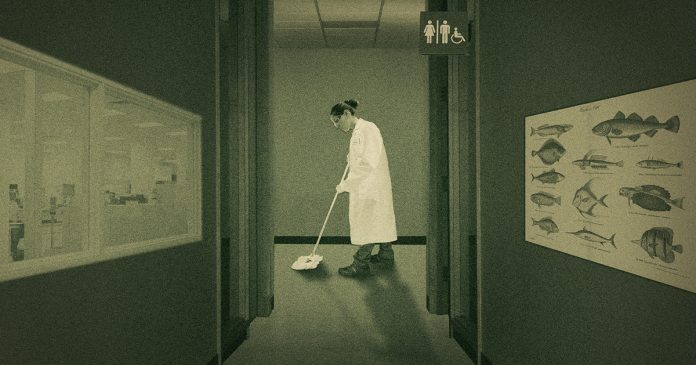Federal scientists responsible for monitoring the health of West Coast fisheries are cleaning office bathrooms and reconsidering critical experiments after the Department of Commerce failed to renew their lab’s contracts for hazardous waste disposal, janitorial services, IT and building maintenance.
Trash is piling up at the Northwest Fisheries Science Center, part of the National Oceanic and Atmospheric Administration, staffers told ProPublica. Ecologists, chemists and biologists at Montlake Laboratory, the center’s headquarters in Seattle, are taking turns hauling garbage to the dumpster and discussing whether they should create a sign-up sheet to scrub toilets.
The scientists — who conduct genetic sampling of endangered salmon to check the species’ stock status and survival — routinely work with chemicals that can burn skin, erupt into flames and cause cancer. At least one said they’d have to delay mission-critical research if hazardous waste removal isn’t restored.
The deteriorating conditions at Montlake stem from a new policy at the Commerce Department that says Secretary Howard Lutnick must personally approve all contracts over $100,000. NPR reported that the bottleneck has disrupted operations at many NOAA facilities.
ProPublica spoke to three Montlake employees who described what it was like to work there as, one by one, service contracts expire and aren’t renewed. People are running around looking for compost bags and wondering who will empty out the female sanitary waste containers in the bathrooms, they said. The floors are getting dirty and workers have no access to vacuums or mops. Some scientists have bought their own soap and cleaning supplies.
Nor can people escape by working from home: the Trump administration has increasingly ordered federal workers to return to the office five days a week. At Montlake, that policy will apply to everyone by April 21.
“It’s making our work unsafe, and it’s unsanitary for any workplace,” but especially an active laboratory full of fire-reactive chemicals and bacteria, one Montlake researcher said.
Press officers at NOAA, the Commerce Department and the White House did not respond to requests for comment.
Montlake employees were informed last week that a contract for safety services — which includes the staff who move laboratory waste off-campus to designated disposal sites — would lapse after April 9, leaving just one person responsible for this task. Hazardous waste “pickups from labs may be delayed,” employees were warned in a recent email.
The building maintenance team’s contract expired Wednesday, which decimated the staff that had handled plumbing, HVAC and the elevators. Other contacts lapsed in late March, leaving the Seattle lab with zero janitorial staff and a skeleton crew of IT specialists.
During a big staff meeting at Montlake on Wednesday, lab leaders said they had no updates on when the contracts might be renewed, one researcher said. They also acknowledged it was unfair that everyone would need to pitch in on janitorial duties on top of their actual jobs.
Nick Tolimieri, a union representative for Montlake employees, said the problem is “all part of the large-scale bullying program” to push out federal workers. It seems like every Friday “we get some kind of message that makes you unable to sleep for the entire weekend,” he said. Now, with these lapsed contracts, it’s getting “more and more petty.”
The problems, large and small, at Montlake provide a case study of the chaos that’s engulfed federal workers across many agencies as the Trump administration has fired staff, dumped contracts and eliminated long-time operational support. Yesterday, hundreds of NOAA workers who had been fired in February, then briefly reinstated, were fired again.
Local management had new service contracts ready to go ages ago, Tolimieri said. The delay from headquarters means employees will struggle to get repairs for their computers or basic building maintenance; the aging elevators at Montlake already break so often that Tolimieri joked it would be easier to send notices on the occasions when they did work.
The fisheries center employs more than 350 people, most of whom work at Montlake. The rest are scattered across several research stations in Oregon and Washington.
Staff at the center conduct research and provide scientific advice for policies on sustainable fishing and endangered species, including a population of orcas in Puget Sound. They test seafood after oil spills to ensure the fish are safe to eat. Their work helps restore native salmon populations and support regional farming.
NOAA is “so uncontroversial,” said the Montlake researcher who’s worried about hazardous waste disposal. Employees are just “trying to do weather reports and give people good seafood.”
The researcher said lab workers are trained in basic lab safety, so the chemicals are properly stored, handled and placed into appropriate waste containers after use. But there’s a limit to how much chemical waste can be kept on site. And the contractors who left were experts on handling emergencies like large chemical spills or serious toxic exposures.
If those contractors don’t return soon, the researcher said, the lab may need to delay or pause important research.
That could include chemical-intensive lab work like testing sea lions, killer whales and walruses from Alaska for environmental contaminants, Tolimieri said.
“For a bunch of people who are screaming about efficiency,” he said, referring to the administration’s efforts to downsize the federal government, “they’ve done the most inefficient things possible.”






